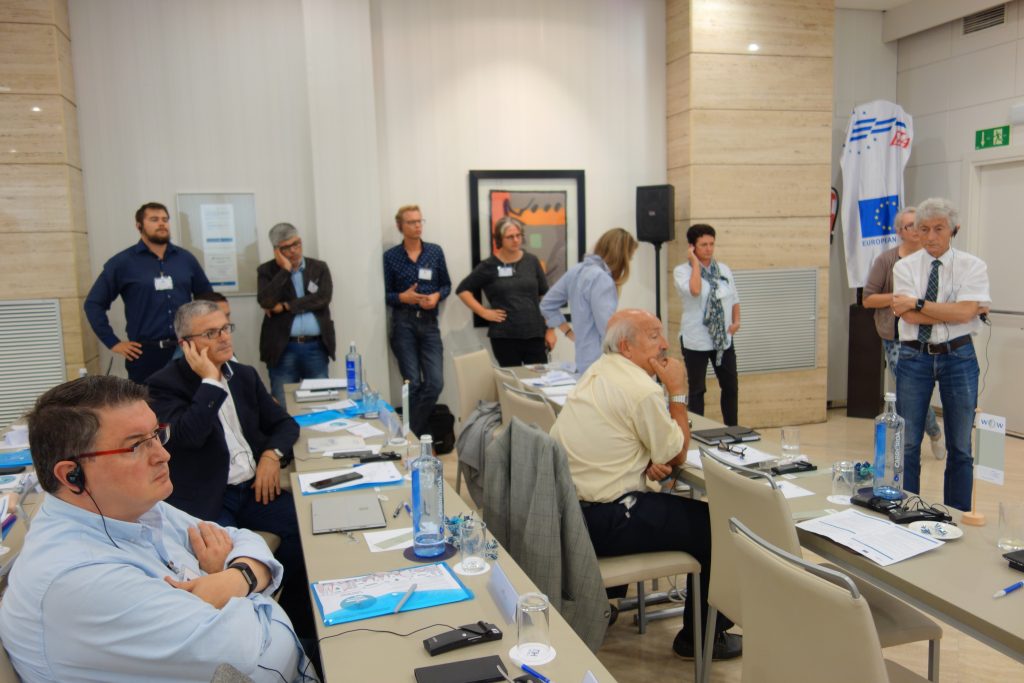From 02 – 04 October 2017 the World Organization of Workers (WOW) in cooperation with the European Centre for Workers’ Questions (EZA) and supported by the European Commission organized a seminar titled “How to strengthen the social partners in relation to the new realities of the social dialogue?”. The seminar took place in Barcelona, Spain during a the aftermath of the Catalonia Referendum for independence.
Today there is a trend is that trade unions in almost all European countries are becoming smaller and weaker. The reasons for the decline in membership differ from one country to the other, but in general one can say that individualization is a key-reason. Other issues which affect the membership of unions are globalisation, increased international competition and deregulation.
Then there is also the developments of a changing labour-force. Employment is shifting from industry, where unionisation rates tend to be relatively high, to private sector services, where unionisation rates are lower. Associated with this shift are the growth of atypical forms of employment, employment at small workplaces and new forms of employment relationship.
When looking at the changing labour-market it is important to stress the importance of company behaviour. Mr. Ronald Dekker, Labour economist at ReflecT, Tilburg University (Netherlands) introduced the term ‘fissuring’ of labour markets and the ‘fissured’ workplace. The phenomenon that workers that contribute to the output of a ‘branded firm’ are not (directly) employed by that ‘branded firm’. In other words: it is about ‘branded firms’ outsourcing their employership. This results in numerous forms of contracts and thus difficulties organizing the employees. This further reduces the costs and risks. The consequences for the workers and society as a whole are huge, because it leads to more dynamics; higher inequality; lower share of labour income. There is an important role to play for the unions here, namely they should monitor the changes, be a countervailing power, and proactively work on social innovation and technological innovation that improves work and working conditions.
When looking at the future of trade unionism in Spain and the role of the social stakeholders in the
economic recovery we see that during the crisis everything was in a standstill. The attitudes of the different social partners radicalized. Not many agreements were signed. Some agreements died as a result of the crisis. And political problems further paralyzed the situation. Mr. Miguel Borra Izquierdo, President Central Sindical Independiente y de Funcionarios – CSI-F (Spain) stated that the Spanish society has changed and needs to recover and increase the social dialogue, as a tool for advance and modernization. It is needed to seek the participation of social agents. Today the society is more complex and demanding. To achieve this some challenges will have to be overcome such as: to obtain the efficiency of the legislative reforms. Recover the credibility of public institutions, political parties and trade unions. Avoid confrontation. Trade unions should focus on no other things than their core business (labour-related issues).
Mr. Bernhard Heinzle, Manager Regional Office Voralberg Gewerkschaft der Privatangestellten, Druck, Journalismus, Papier (Austria) then spoke of trade unions surviving all political times which would be easier if they dare to become more innovative! This should be both externally as internally. Externally the FCG changed. Whereas in the past we said we help you, we now say we guide you to where you want to go. This is quite a different approach. Internally we changed the meeting culture. In the past it was almost a game to have long meetings sometimes deep into the night. There is no need for this. And we need to realize and tell ourselves that work should be fun too. We should not only approach it in a negative manner and only discuss the problems. Fun is very important too!
And that is exactly how many people perceive the trade unions. As quite negative and only focusing on the problems. This is an image that needs to be changed. Mr. Sr?an Dimitrijevi?, Broadcast Journalist at RTS Radio Televizija Srbije (Serbia) presented some strategies to improve this image. There are factors of importance. This ranges from presenting oneself well in the media to telling a positive story to clearly show that the work of union can make the difference. All too often people are connecting unions to problems. By communicating better and in a different way trade unions should be able to be perceived in a more positive and constructive way.
Mrs. Dr. Patricia Elgoibar, Department of Business at the Faculty of Economics and Business, Universitat de Barcelona (Spain) focused on the promotion of social dialogue. Particularly concerning the experiences and expectations from employers and employee representatives in Europe. What can be seen is that there is a general feeling of mistrust. Bothe sides of the spectrum do not always have confidence in each other. The expectations are not the same. In quite some cases this leads to conflict. And during the conflict the expectancies still differ. In those cases mediation can be very helpful and in some cases even a necessity. Trust is pivotal and one can see that ‘companies with higher levels of mutual trust between managers and workers‘ representatives tend to score better in terms of well-being in the workplace, as well as in their performance.‘ (EC Commissioner Thyssen). So there are some objectives here.
Trust is key when looking at social dialogue. Trust between employer and employee, between employer and trade union, between employee and trade union. And lest not forget the role of the government. Social dialogue is something to be cherished. It has proven its importance in the past and will continue to show its importance in the future. A future that is different and with new challenges, but also a future where changes can be achieved. And for that social dialogue is pivotal.
for pictures click here





